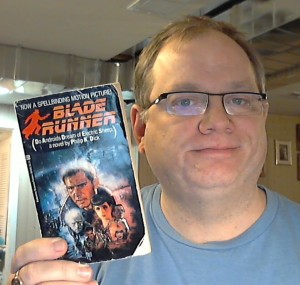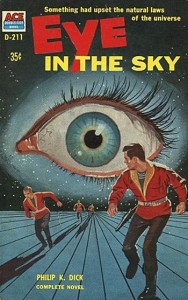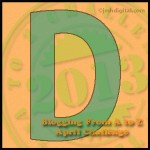I could have easily done a post for the letter D on Johnny Depp, but since I am already doing a year long tribute to Depp on my blog, I thought I would take the opportunity to talk about another big “D” in my life – Philip K. Dick.
For those of you who may have never heard the name before, Philip K. Dick or PKD for short, was a prolific SF writer that got his start writing short stories in the 1950s, but was soon writing and publishing novels at a furious pace. I believe its 121 short stories and 44 novels in the span of about 30 years. The fact that PKD was writing while on amphetamines for a large part of his career may help explain it. Dick died in 1982 at the age of 53 from a stroke just a few months before the film Blade Runner, based on his novel “Do Androids Dream of Electric Sheep?”, was released in theatres. Since the time of his death his estate has kept pretty tight control on the rights of his stories and have made more than 11 films based on PKDs visions.

I discovered PKD almost by accident having seen Blade Runner as an impressionable teen and decided to buy the “novelization” of the movie. Back in the day “novelizations” of film was one of the ways a lot of people relieved their movie going experience. Essentially reading a fleshed out version of the movie script, penned by some author for hire. Fortunately for millions of SF fans around the world, Dick’s estate insisted that the novel Do Androids Dream of Electric Sheep? be released in its entirety as the novelization of the movie, under the title Blade Runner. So kids like me picking it up a copy were blown away to find a much richer novel than ever made it to screen. In fact the book came with a disclaimer/warning.
Publisher’s Note: In 1968, Philip K. Dick wrote Do Androids Dream of Electric Sheep, a brilliant sf novel that became the source of the motion picture Blade Runner. though the novel’s characters and backgrounds differ in some respects from those in the film, readers who enjoy the latter will discover an added dimension on encountering the original work. Del Rey Books is pleased to return the novel to print.
“Differ in some respects” has to be the understatement of the decade in this case. Entire characters and sub-plots were eliminated between the novel and the movie and while I can see why the director / screenwriters might decide to streamline the novel for the screen, the novel shed an entire different light on the characters and the story.
Dick was fascinated with the question “What is Real?”. Many of his stories are metaphysical and philosophical attempt to explore the issue of what is real and what does it mean to be human. The androids of Blade Runner, the ersatz pets in the novel are all manifestations of this. Dick’s stories are often told from the point-of-view of a working class joe, who’s up against an uncaring universe and often being held down by a big government or a religious establishment. Dick often coined new words like kipple – meaning the physical and emotional detritus commonly found in the homes and lives of his characters. As well he was ‘inventing’ tech in his novels that would often seem prescient. Dick featured homeopapes, a sort of ebook precursor, for people to “download” news stories as well as the conapt which is a hybrid condo and apartment.
 While I was blown away by the Do Androids Dream of Electric Sheep, it’s not even my favourite Philip K. Dick book. By far UBIK has to be my favourite, followed closely by Eye in the Sky. Both books feature Dick’s classic dark humour and struggle against futility. In UBIK characters are not sure whether they are alive and the rest of the world is dead or vice versa. They are running out of time to discover the truth when things start rolling back to their previous forms and time seems to be reverting to earlier times as well. In Eye in the Sky a group of 8 people are transported out of their conciousness into a shared reality where different characters have control over the “world” they live in. Dark and humorous, in places I find Dick’s work can wear you down if you read too many books in one sitting.
While I was blown away by the Do Androids Dream of Electric Sheep, it’s not even my favourite Philip K. Dick book. By far UBIK has to be my favourite, followed closely by Eye in the Sky. Both books feature Dick’s classic dark humour and struggle against futility. In UBIK characters are not sure whether they are alive and the rest of the world is dead or vice versa. They are running out of time to discover the truth when things start rolling back to their previous forms and time seems to be reverting to earlier times as well. In Eye in the Sky a group of 8 people are transported out of their conciousness into a shared reality where different characters have control over the “world” they live in. Dark and humorous, in places I find Dick’s work can wear you down if you read too many books in one sitting.
Since his death, PKD’s popularity has continued to rise, largely based on the mainstream success of his movies and just that a broader audience is now discovering his work now.
A list of films adapted from PKDs work
- Blade Runner (1982)
- Total Recall (1990)
- Screamers (1995)
- Minority Report (2002)
- Imposter (2003)
- Paycheck (1965)
- A Scanner Darkly (2005)
- Next (2007)
- The Adjustment Bureau (2011)


hee, that’s a great story about the “novelization”!